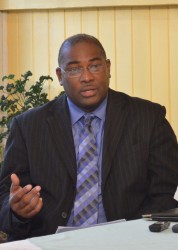Convenor of the Steering Committee for Constitu-tional Reform (SCCR) Nigel Hughes has disputed former Attorney General and People’s Progressive Party (PPP/C) MP Anil Nandlall’s assertion that there were no public consultations conducted by the committee.
“I have noted in today’s article Mr. Nandlall said there was no consultation. For the purposes of accuracy, the committee consulted with several persons including the following: Ravi Dev, David Hinds, Ralph Ramkarran, Miles Fitzpatrick, Karen De Souza Vanda Radzik, Sir Fenton Ramsahoye, Melinda Janki and Stephen Fraser,” Hughes told Stabroek News.
He was referring to an article in the Monday, November 7th, 2016 edition of the Stabroek News, headlined ‘Constitution reform onus on gov’t – Ramotar, Nandlall,’ where Nandlall said the committee did not hold consultations.

“The government in an effort to pay lip service to its platform promise on constitutional reform, unilaterally and without any consultation whatsoever, established a constitutional reform steering committee. This committee, as far as I am aware, again held absolutely no consultations with anyone, prepared a report, handed same to the Prime Minister, and no one has heard or seen this report since… I don’t think and there is no evidence to suggest that the government is serious about constitutional reform,” Nandlall had stated.
Hughes pointed to the nine persons the committee met with. “The budget and terms of reference prevented wider consultations,” he added.
Nandlall yesterday maintained that he was never aware of any consultations and also questioned why, given that his party is the only opposition in the National Assembly, it was bypassed for consultations.
“Those consultations must have been done very discreetly, as the public is unaware of such engagements. It is quite unfortunate also that the committee, by itself and on its own accord, determined with whom they would consult. One would observe from this list that major opposition party, and in fact the only opposition party in the Parliament, was excluded,” he posited.
“Any consultation on any issue of such public importance which would exclude the largest singular political party in the country is… deficient and defective. You would note also that those who were consulted do not represent the other major interest groups in this country. For example, no one from the religious organizations was consulted; no one from the labour union was consulted; no one from the private sector was consulted; no one from the farmers’ organizations was consulted; no one from any civil society organization, the human rights organization, no executive from the Guyana Bar Association; no one from the Berbice Bar association…I, therefore, find the consultations which were done, to be quite strange, to say in the least,” he added.
The APNU+AFC government has come in for strong criticism for not holding true to its promise of starting a constitutional reform process within 100 days of being in office.
Professor Harold Lutchman and head of the 2000 Constitution Reform Commission Ralph Ramkarran have said that neither the coalition government nor the opposition PPP/C appear to have any appetite for constitutional reform.
However, Nandlall and former president Donald Ramotar say that the PPP/C should be excluded from the criticisms and defended their party’s record on constitutional reform, saying that it is now up to the APNU+AFC government to fulfil its manifesto commitments and take up from where the PPP/C had left off.
“I don’t believe that the statements (Lutchman’s and Ramkarran’s) ring true for the PPP because we promised that we will change the 1980 constitution and we changed it. We made nearly 200 changes to it. We did not do it unilaterally but through the broadest … process,” Nandlall argued, referring to the process initiated in 1999.
“The PPP position on constitutional reform is consistent. We believe the constitution should remain under scrutiny and we are of the view that constitutional reform is a consultative process …on the other hand, the statement rings true, for the APNU+AFC. We didn’t promise constitutional reform in our manifesto, they did that, and they said within 100 days the public would have seen the process started, but 600 days have passed and it has not commented,” he added.
Lutchman and Ramkarran told this newspaper that the 18-month-old coalition-led government and the PPP/C do not appear to have any appetite for constitutional reform, with both sides historically wary of giving up presidential powers.
“What they support when they are in government is entirely different to what they support when they are out of government. The same thing they criticize when they are out of power, the same thing when they are in power they don’t see anything wrong with,” Lutchman, who was a member of the SCCR told Stabroek News in an interview. Prime Minister Moses Nagamootoo received the SCCR report on April 30th, 2016 but six months later it has not been released neither have plans for it been announced.
Lutchman’s view was echoed by Ramkarran, who said that the APNU+AFC-led coalition government has been very slothful in getting the process started, although it would have been high on its manifesto priorities.
When the APNU+AFC coalition won office last year May, the SCCR was appointed by Prime Minister Nagamootoo and comprised Hughes, Lutchman, attorneys Gino Persaud and Geeta Chandan-Edmond, as well as Haslyn Parris, who has since passed away.
The Prime Minister had explained that the remit of the committee was to give direction and scope within which the constitutional reform process should take place. He noted that the coalition parties had placed the issue of constitutional reform high on their agenda.
The committee has submitted its report but President David Granger subsequently pointed out that proposals for constitutional reform should come from the people following widespread consultations
In his address to Parliament in October, President Granger said that his government would convene a Consultative Constitution Reform Commission in 2017.”
Observers have pointed out that the vague reference to 2017 would call into question the solemn manifesto commitments by the coalition to a swift process.









